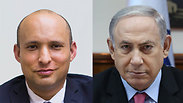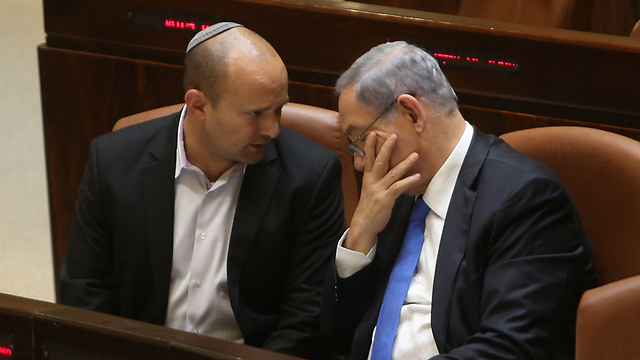
Prime Minister Netanyahu (R) and Bayit Yehudi leader Bennett. Political spins
צילום: עמית שאבי, דניאל אליאור
Netanyahu vs. Bennett: Who is ‘the real rightist’?
Op-ed: In the past, the PM left the ‘hardcore right’ to smaller parties and focused on the moderate and centrist right. The last elections, though, changed his political perception. Now, he is focusing on Bayit Yehudi’s voters, binding himself to every whim and spin from the right.
Likud members are complaining that Bayit Yehudi leader Naftali Bennett is creating political spins at their expense. After he proposed a bill to prevent Jerusalem’s division, all hell broke loose in their reactions. The Likud (or, in its real name, Benjamin Netanyahu) is right this time. Bennett is looking for opportunities to embarrass Netanyahu’s rightism, to raise the curtain wherever he can. When it only happens once, it’s a fundamental argument. When it happens all the time, it’s a trend.

With the absence of a snappy opposition leader, Bennett is as close as it gets. He criticizes Netanyahu, challenges him in every cabinet meeting and in every media interview, and makes him retract his decisions once a week. If Bennett speaks out against construction in Qalqilya, Netanyahu remembers that he is unfamiliar with such a plan. If Bennett is in favor of an ethical code, Netanyahu releases a statement on the NGO Law. If Bennett backs the Shin Bet in its interrogations of Jews in the Duma arson case, Netanyahu follows in his footsteps. These two have been walking together since the elections, as if they have agreed to do so.

Bennett is looking for opportunities to embarrass Netanyahu’s rightism, to raise the curtain wherever he can (Photo: Alex Kolomoisky) (צילום: אלכס קולומויסקי)
The source of the current political spin, the ones that preceded it and the ones that will follow can be found in that moment on the eve of the 2015 elections, when Bennett went up on the stage with a guitar to sing for Netanyahu in a right-wing rally. He sang, “Jerusalem of Gold,” supporting and encouraging the prime minister, while the votes were moving in Netanyahu’s direction. In politics, support can spoil everything.
In the past, Netanyahu had a different political perception. He left the “hardcore right” to smaller parties and focused on the mass of the moderate and centrist right. In election campaigns, the Likud spoke about security and peace, about economy and prevention of terror. The party’s radicals were hidden and pushed aside; the statesmanlike ones were at the forefront of the campaign.
The last elections changed Netanyahu, as well as his relations with the “hardcore right.” Netanyahu is now focusing on Bennett’s voters. He looks at the journalists who are willing to take a bullet for him, he reviews the numbers of the Likud’s national-religious volunteers and voters and the ideological right-wing base, and he understands that no matter what he does—they’re the people he doesn’t have to convince. They’re in his pocket, and one vote in the pocket is worth two votes in the bush.
The more Netanyahu leans to the right, the more he narrows Bennett’s political space and drags him to an increasing number of wars over the title of “the real rightist,” thereby stopping Bennett—who, despite the skullcap on his head, is a pragmatic and non-messianic rightist—from being one, and binding himself to every whim and spin from the right.
Take the Jerusalem bill, for example. There are many national problems in Jerusalem. I try to write and deal with them every few weeks. The division issue is not one of them. Jerusalem is indivisible, period. So the numbers make no difference. We can’t ignore the fact that Israel’s governments are living in peace with the separation from five neighborhoods-villages in Jerusalem, that Israel’s capital has a tall fence with barriers preventing Israelis from entering, and that behind them there are Palestinian neighborhoods with no army or police, with full control of the Palestinian Authority at best and of Hamas at the worst. Areas with anarchy, terror cells and no governance. An absolute majority of Israelis don’t know about them and have never been there.
Jerusalem Mayor Nir Barkat once suggested separating these neighborhoods from the city. Netanyahu has spoken in favor of the move in the past. Knesset Member Yoav Kisch, chairman of the Greater Land of Israel Lobby, supported the move on the eve of the elections. Former Yesha Council director Pinchas Wallerstein and myself considered the idea of transferring Kafr 'Aqab to the Palestinian Authority and annexing Givat Ze’ev. Former Minister Gideon Sa’ar is in favor of a municipal change, Bennett is in favor at the right moment, and so are many of the Likud ministers. How do I know? I heard it first-hand.
The second option is to tear down the walls and really annex the 100,000 Palestinians living there. To control them rather than just saying we control them. I know two people who support this option too: Jerusalem Councilman Arieh King and Bayit Yehudi MK Bezalel Smotrich.
The law is not the problem, and the compromise Bennett and Minister of Jerusalem Affairs Ze’ev Elkin will come up with is not the solution. The only thing that can be done is to hold a governmental discussion on what should be done with these five neighborhoods. To tell the truth. To recognize the fact that we’re not there and to decide if we should be there or nor. No one will remember Netanyahu and Bennett’s spins 50 years from now, but one day someone will ask what they did about these neighborhoods. How could they ignore them?










